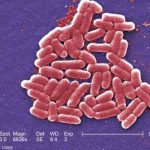XL Foods announced this week that it was giving control of the Alberta Canada plant to the world's largest beef processing company: JBS of Brazil. Beef from that facility, which has been closed since September 28, 2012, is linked to an E. coli 0157:H7 outbreak that has sickened at least 16 people in Canada. If XL sells the facility to JBS, they will receive $100 million in the deal. JBS will not assume any XL Foods debt or liabilities. The facility has recalled millions of pounds of beef products, including ground beef, roasts, steaks, jerky, and other foods since September 17, 2012. The recall has been expanded 18 times. The Canadian government said that the change in management "will not affect the CFIA's assessment" of the facility. So far, the CFIA's test results in their … [Read more...]
CFIA’s Investigation into XL Foods Facility for E. coli 0157:H7
The Canadian Food Inspection Agency has updated its investigation into the XL Foods facility where positive E. coli 0157:H7 tests led to a huge recall of beef trim, ground beef, and products made with ground beef. The government has reviewed food safety controls at the facility. The review focused on "the plant's preventative control measures, food-safety policies and procedures, laboratory methodology, and equipment and quality systems." The review did not find one single factor that led to the contamination, but found several deficiencies that, when combined, could have played a role. The report states that, "the detection of E. coli in slaughter facilities is not uncommon, and plants are expected to have adequate measures in place to monitor higher than normal detection rates and … [Read more...]
Canada Will Move to New Single Food Safety Inspection System
The Canadian Food Inspection Agency (CFIA) has released a draft about improving their food inspection model. The single system model would replace the eight different inspection systems currently in place. Now, the inspection models covers dairy, eggs, meat, processed foods, imported and manufactured food, fish and seafood, and fresh fruits and vegetables separately. Each facility will be issued a single license. Additional licenses will not be required for additional activities or products. The facilities will provide information about their business, such as management's commitment to meeting regulations, preventative control plans, that key personnel have completed food handling training, and which products will be produced under different processes. This information will help the … [Read more...]







